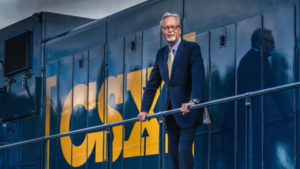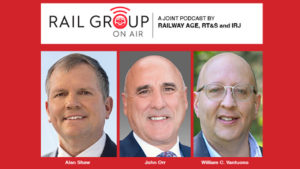Norfolk Southern’s Greencastle project on track
Written by jroodNorfolk Southern will break ground on its Greencastle, Pa., intermodal rail facility this summer despite news coming from Capitol Hill, a spokesman said, the Herald-Mail reports. The mix of proposed legislation and funding denials that is troubling company executives and local legislators has yet to slow the Greencastle project, said Rudy Husband, director of public relations for Norfolk Southern.
In February, the U.S.
Department of Transportation denied stimulus money to Pennsylvania facilities
proposed along the company’s Crescent Corridor. Only intermodal facilities in
Tennessee and Alabama received Transportation Investment Generating Economic
Recovery (TIGER) funds.
While, in general, the
company was satisfied with the grant award, Husband said it had hoped that
Pennsylvania, which took the lead in applying for TIGER money, would reap a
similar reward.
As the company seeks other
streams of public revenue and pushes forward with the Greencastle project, U.S.
Rep. Bill Shuster, R-Pa., warned that Congress could derail its efforts. Shuster,
who is a major supporter of the Greencastle facility, said in an opinion column
in "The Hill" that the rail industry is "in Congress’ cross hairs" for
re-regulation.
Legislation introduced by
House and Senate Democrats in 2009 would allow rail customers to more easily
challenge transportation rates and would subject the railroad industry to
stiffer antitrust scrutiny. Calling the legislation "re-regulation," Shuster
said if Congress re-regulates rail, "it will be a matter of time before our
once self-reliant railroads are forced to rely on taxpayer dollars to invest in
infrastructure and safety improvements as federal mandates mount." Because the
legislation is pending, it is unclear what effects it could have on existing
rail projects, Husband said.
"The proposed re-regulation
of the rail industry could have a disastrous effect on investment in railroad
infrastructure," he said. "But since the bill has not been passed, it is
impossible to say how projects currently under way, such as Greencastle, could
be affected."
Shuster said the
legislation could "erase 30 years of positive growth and threaten to reduce the
railroads to ruinous decreases in services and disinvestment not seen since the
1970s."
However, Jeff Urbanchuck, a
spokesman for Shuster, said Friday that neither of the two bills has been
re-introduced in the current session.
U.S. Sen. Jay Rockefeller,
D-W.Va., introduced the bills in the Senate in December. U.S. Rep. Nick Rahall,
D-W.Va., sponsored the bill in the House. Both bills revise the objectives of
U.S. rail transportation policy, including the protection of rail shippers and
workers on the tracks. Rockefeller’s office did not respond when contacted for
comment.
In addition to proposed
legislation, Shuster said federal mandates are taking a toll on the rail
companies as they seek to expand services. Positive Train Control was a mandate
in the Rail Safety Improvement Act, which was signed into law Oct. 16, 2008, by
President George Bush.
Enforced by the Federal
Railroad Administration (FRA), PTC measures are capable of preventing
train-to-train collisions, overspeed derailments and injuries or casualties to
workers, according to the FRA Web site. While no train-to-train collisions have
occurred in Franklin County’s recent history, Norfolk Southern trains were
involved in recent accidents that claimed multiple lives in the Tri-State area.
Wick Moorman, Norfolk
Southern’s chairman, president and CEO, referred to the proposed legislation
and PTC mandate as "the biggest black cloud on the horizon for Norfolk Southern
and the industry."
Despite challenges, Norfolk
Southern has invested $41 million to date in the Greencastle project, Husband
said. Comparatively, the company plans to spend $40 million in 2010 addressing
required changes under the PTC mandate, Moorman said.
"The upshot of this
ill-conceived, if well intentioned, unfunded mandate and its associated rule
making, is that we will be forced to forgo major capital expenditures for other
critical areas of our property," he said. "And the result may well be less
capacity than is required to handle traffic volumes, a diminished ability to
provide good service and even possibly a less safe working environment than we
might have had otherwise."





